Impact of Unconventional Financing on Nigerian SMEs: Analysis
VerifiedAdded on 2022/09/16
|39
|12541
|15
Annotated Bibliography
AI Summary
This annotated bibliography examines the impact of unconventional financing on Nigerian SMEs, drawing on eight articles. The articles explore various aspects, including the influence of religion on entrepreneurial intentions, financing options for family businesses in Ghana, the effects of demographic characteristics on tax compliance, improving credit accessibility in Uganda, the relevance of entrepreneurial orientation to SME performance, factors affecting e-commerce adoption, strategic planning and competitive advantage of ICT SMEs, and the interactions between microfinance institutions and SMEs in Ghana. The studies utilize diverse methodologies, including questionnaires, statistical analysis, and survey methods, to investigate challenges such as inadequate financing, high-interest rates, and the need for improved credit accessibility. The findings highlight the importance of unconventional financing in supporting SME growth, the role of government initiatives, and the impact of various factors on business performance and tax compliance. The bibliography provides a comprehensive overview of the current research landscape and the critical role of financing in the success and development of SMEs in Nigeria and other African countries.
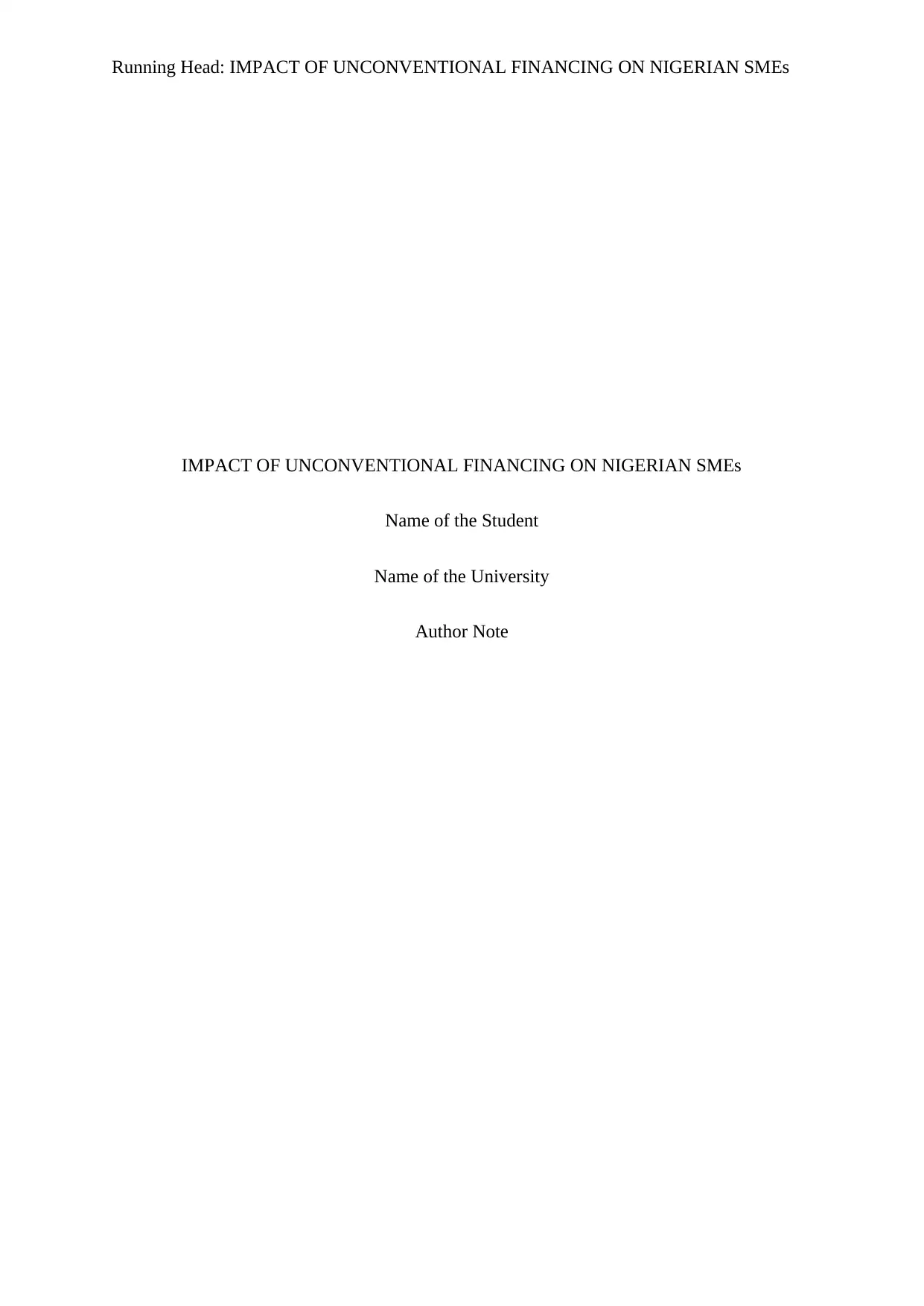
Running Head: IMPACT OF UNCONVENTIONAL FINANCING ON NIGERIAN SMEs
IMPACT OF UNCONVENTIONAL FINANCING ON NIGERIAN SMEs
Name of the Student
Name of the University
Author Note
IMPACT OF UNCONVENTIONAL FINANCING ON NIGERIAN SMEs
Name of the Student
Name of the University
Author Note
Paraphrase This Document
Need a fresh take? Get an instant paraphrase of this document with our AI Paraphraser
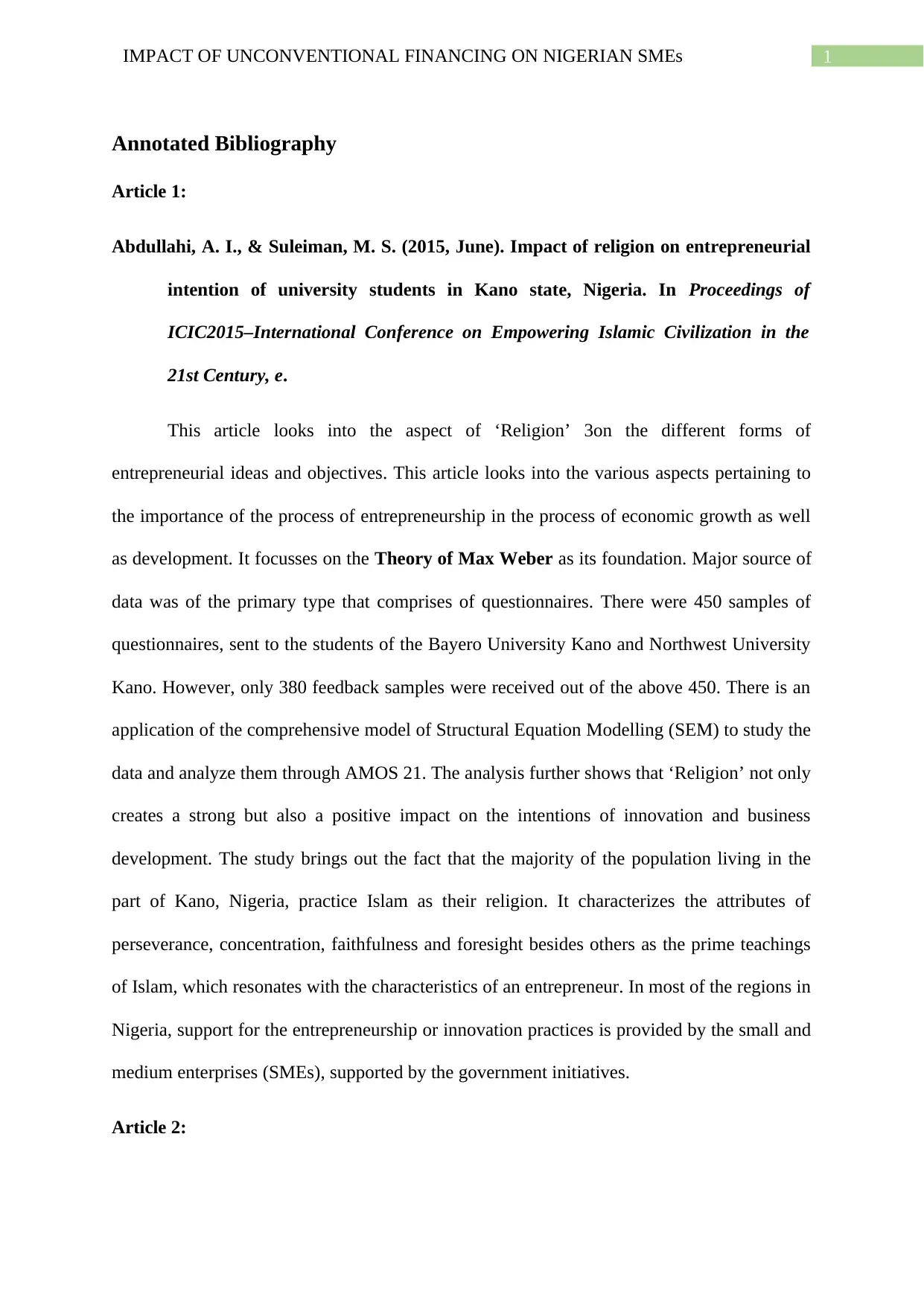
1IMPACT OF UNCONVENTIONAL FINANCING ON NIGERIAN SMEs
Annotated Bibliography
Article 1:
Abdullahi, A. I., & Suleiman, M. S. (2015, June). Impact of religion on entrepreneurial
intention of university students in Kano state, Nigeria. In Proceedings of
ICIC2015–International Conference on Empowering Islamic Civilization in the
21st Century, e.
This article looks into the aspect of ‘Religion’ 3on the different forms of
entrepreneurial ideas and objectives. This article looks into the various aspects pertaining to
the importance of the process of entrepreneurship in the process of economic growth as well
as development. It focusses on the Theory of Max Weber as its foundation. Major source of
data was of the primary type that comprises of questionnaires. There were 450 samples of
questionnaires, sent to the students of the Bayero University Kano and Northwest University
Kano. However, only 380 feedback samples were received out of the above 450. There is an
application of the comprehensive model of Structural Equation Modelling (SEM) to study the
data and analyze them through AMOS 21. The analysis further shows that ‘Religion’ not only
creates a strong but also a positive impact on the intentions of innovation and business
development. The study brings out the fact that the majority of the population living in the
part of Kano, Nigeria, practice Islam as their religion. It characterizes the attributes of
perseverance, concentration, faithfulness and foresight besides others as the prime teachings
of Islam, which resonates with the characteristics of an entrepreneur. In most of the regions in
Nigeria, support for the entrepreneurship or innovation practices is provided by the small and
medium enterprises (SMEs), supported by the government initiatives.
Article 2:
Annotated Bibliography
Article 1:
Abdullahi, A. I., & Suleiman, M. S. (2015, June). Impact of religion on entrepreneurial
intention of university students in Kano state, Nigeria. In Proceedings of
ICIC2015–International Conference on Empowering Islamic Civilization in the
21st Century, e.
This article looks into the aspect of ‘Religion’ 3on the different forms of
entrepreneurial ideas and objectives. This article looks into the various aspects pertaining to
the importance of the process of entrepreneurship in the process of economic growth as well
as development. It focusses on the Theory of Max Weber as its foundation. Major source of
data was of the primary type that comprises of questionnaires. There were 450 samples of
questionnaires, sent to the students of the Bayero University Kano and Northwest University
Kano. However, only 380 feedback samples were received out of the above 450. There is an
application of the comprehensive model of Structural Equation Modelling (SEM) to study the
data and analyze them through AMOS 21. The analysis further shows that ‘Religion’ not only
creates a strong but also a positive impact on the intentions of innovation and business
development. The study brings out the fact that the majority of the population living in the
part of Kano, Nigeria, practice Islam as their religion. It characterizes the attributes of
perseverance, concentration, faithfulness and foresight besides others as the prime teachings
of Islam, which resonates with the characteristics of an entrepreneur. In most of the regions in
Nigeria, support for the entrepreneurship or innovation practices is provided by the small and
medium enterprises (SMEs), supported by the government initiatives.
Article 2:
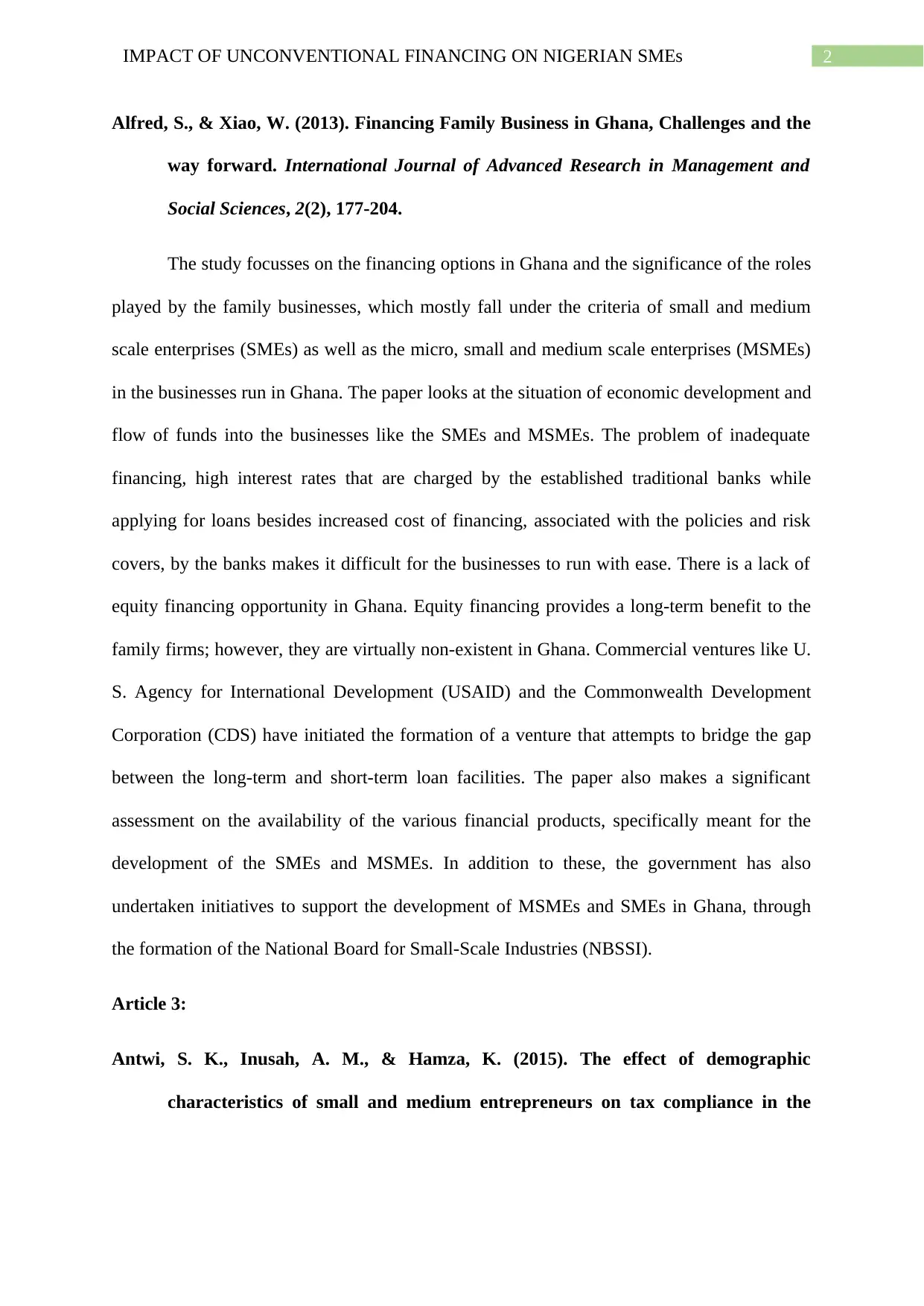
2IMPACT OF UNCONVENTIONAL FINANCING ON NIGERIAN SMEs
Alfred, S., & Xiao, W. (2013). Financing Family Business in Ghana, Challenges and the
way forward. International Journal of Advanced Research in Management and
Social Sciences, 2(2), 177-204.
The study focusses on the financing options in Ghana and the significance of the roles
played by the family businesses, which mostly fall under the criteria of small and medium
scale enterprises (SMEs) as well as the micro, small and medium scale enterprises (MSMEs)
in the businesses run in Ghana. The paper looks at the situation of economic development and
flow of funds into the businesses like the SMEs and MSMEs. The problem of inadequate
financing, high interest rates that are charged by the established traditional banks while
applying for loans besides increased cost of financing, associated with the policies and risk
covers, by the banks makes it difficult for the businesses to run with ease. There is a lack of
equity financing opportunity in Ghana. Equity financing provides a long-term benefit to the
family firms; however, they are virtually non-existent in Ghana. Commercial ventures like U.
S. Agency for International Development (USAID) and the Commonwealth Development
Corporation (CDS) have initiated the formation of a venture that attempts to bridge the gap
between the long-term and short-term loan facilities. The paper also makes a significant
assessment on the availability of the various financial products, specifically meant for the
development of the SMEs and MSMEs. In addition to these, the government has also
undertaken initiatives to support the development of MSMEs and SMEs in Ghana, through
the formation of the National Board for Small-Scale Industries (NBSSI).
Article 3:
Antwi, S. K., Inusah, A. M., & Hamza, K. (2015). The effect of demographic
characteristics of small and medium entrepreneurs on tax compliance in the
Alfred, S., & Xiao, W. (2013). Financing Family Business in Ghana, Challenges and the
way forward. International Journal of Advanced Research in Management and
Social Sciences, 2(2), 177-204.
The study focusses on the financing options in Ghana and the significance of the roles
played by the family businesses, which mostly fall under the criteria of small and medium
scale enterprises (SMEs) as well as the micro, small and medium scale enterprises (MSMEs)
in the businesses run in Ghana. The paper looks at the situation of economic development and
flow of funds into the businesses like the SMEs and MSMEs. The problem of inadequate
financing, high interest rates that are charged by the established traditional banks while
applying for loans besides increased cost of financing, associated with the policies and risk
covers, by the banks makes it difficult for the businesses to run with ease. There is a lack of
equity financing opportunity in Ghana. Equity financing provides a long-term benefit to the
family firms; however, they are virtually non-existent in Ghana. Commercial ventures like U.
S. Agency for International Development (USAID) and the Commonwealth Development
Corporation (CDS) have initiated the formation of a venture that attempts to bridge the gap
between the long-term and short-term loan facilities. The paper also makes a significant
assessment on the availability of the various financial products, specifically meant for the
development of the SMEs and MSMEs. In addition to these, the government has also
undertaken initiatives to support the development of MSMEs and SMEs in Ghana, through
the formation of the National Board for Small-Scale Industries (NBSSI).
Article 3:
Antwi, S. K., Inusah, A. M., & Hamza, K. (2015). The effect of demographic
characteristics of small and medium entrepreneurs on tax compliance in the
⊘ This is a preview!⊘
Do you want full access?
Subscribe today to unlock all pages.

Trusted by 1+ million students worldwide
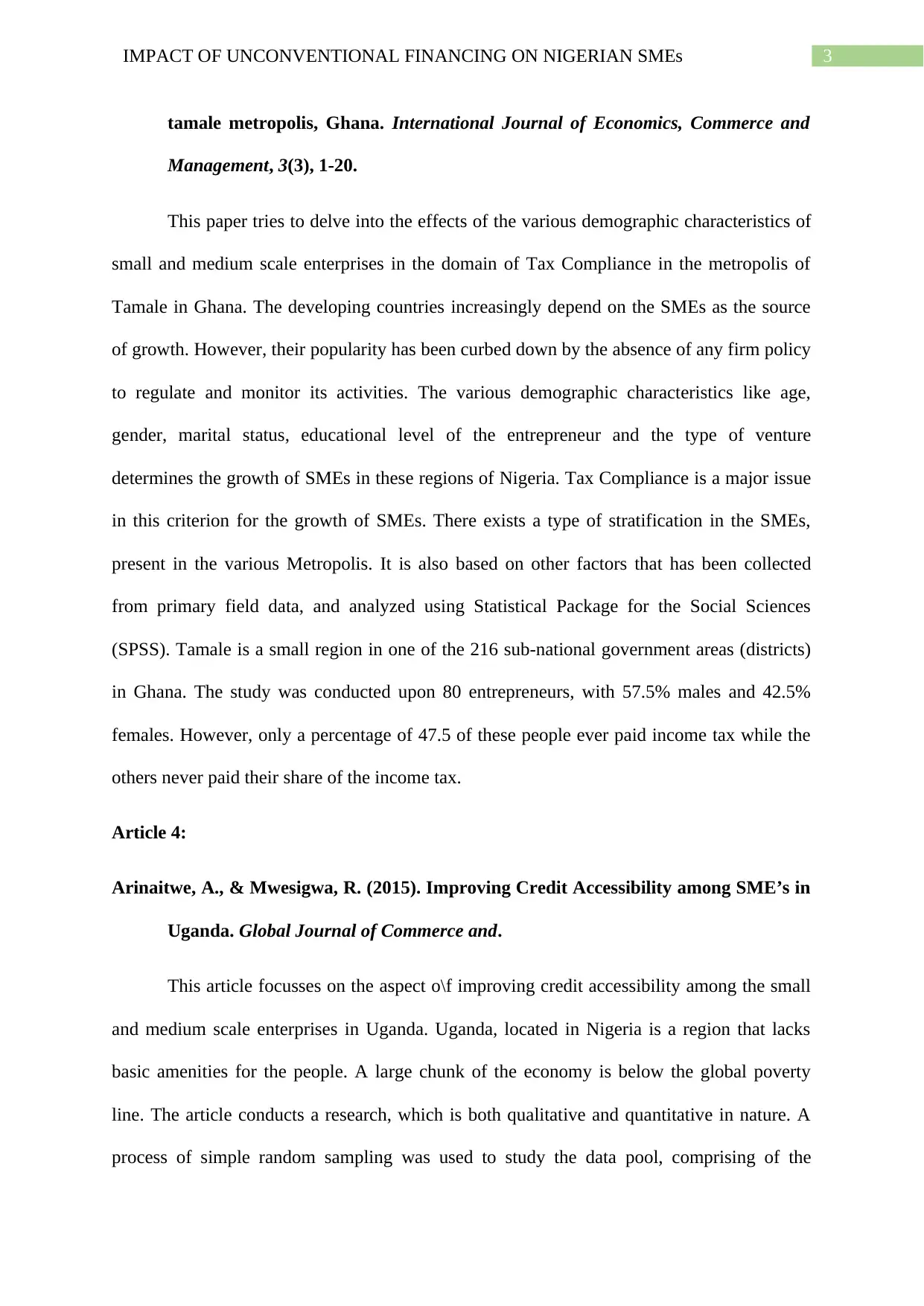
3IMPACT OF UNCONVENTIONAL FINANCING ON NIGERIAN SMEs
tamale metropolis, Ghana. International Journal of Economics, Commerce and
Management, 3(3), 1-20.
This paper tries to delve into the effects of the various demographic characteristics of
small and medium scale enterprises in the domain of Tax Compliance in the metropolis of
Tamale in Ghana. The developing countries increasingly depend on the SMEs as the source
of growth. However, their popularity has been curbed down by the absence of any firm policy
to regulate and monitor its activities. The various demographic characteristics like age,
gender, marital status, educational level of the entrepreneur and the type of venture
determines the growth of SMEs in these regions of Nigeria. Tax Compliance is a major issue
in this criterion for the growth of SMEs. There exists a type of stratification in the SMEs,
present in the various Metropolis. It is also based on other factors that has been collected
from primary field data, and analyzed using Statistical Package for the Social Sciences
(SPSS). Tamale is a small region in one of the 216 sub-national government areas (districts)
in Ghana. The study was conducted upon 80 entrepreneurs, with 57.5% males and 42.5%
females. However, only a percentage of 47.5 of these people ever paid income tax while the
others never paid their share of the income tax.
Article 4:
Arinaitwe, A., & Mwesigwa, R. (2015). Improving Credit Accessibility among SME’s in
Uganda. Global Journal of Commerce and.
This article focusses on the aspect o\f improving credit accessibility among the small
and medium scale enterprises in Uganda. Uganda, located in Nigeria is a region that lacks
basic amenities for the people. A large chunk of the economy is below the global poverty
line. The article conducts a research, which is both qualitative and quantitative in nature. A
process of simple random sampling was used to study the data pool, comprising of the
tamale metropolis, Ghana. International Journal of Economics, Commerce and
Management, 3(3), 1-20.
This paper tries to delve into the effects of the various demographic characteristics of
small and medium scale enterprises in the domain of Tax Compliance in the metropolis of
Tamale in Ghana. The developing countries increasingly depend on the SMEs as the source
of growth. However, their popularity has been curbed down by the absence of any firm policy
to regulate and monitor its activities. The various demographic characteristics like age,
gender, marital status, educational level of the entrepreneur and the type of venture
determines the growth of SMEs in these regions of Nigeria. Tax Compliance is a major issue
in this criterion for the growth of SMEs. There exists a type of stratification in the SMEs,
present in the various Metropolis. It is also based on other factors that has been collected
from primary field data, and analyzed using Statistical Package for the Social Sciences
(SPSS). Tamale is a small region in one of the 216 sub-national government areas (districts)
in Ghana. The study was conducted upon 80 entrepreneurs, with 57.5% males and 42.5%
females. However, only a percentage of 47.5 of these people ever paid income tax while the
others never paid their share of the income tax.
Article 4:
Arinaitwe, A., & Mwesigwa, R. (2015). Improving Credit Accessibility among SME’s in
Uganda. Global Journal of Commerce and.
This article focusses on the aspect o\f improving credit accessibility among the small
and medium scale enterprises in Uganda. Uganda, located in Nigeria is a region that lacks
basic amenities for the people. A large chunk of the economy is below the global poverty
line. The article conducts a research, which is both qualitative and quantitative in nature. A
process of simple random sampling was used to study the data pool, comprising of the
Paraphrase This Document
Need a fresh take? Get an instant paraphrase of this document with our AI Paraphraser
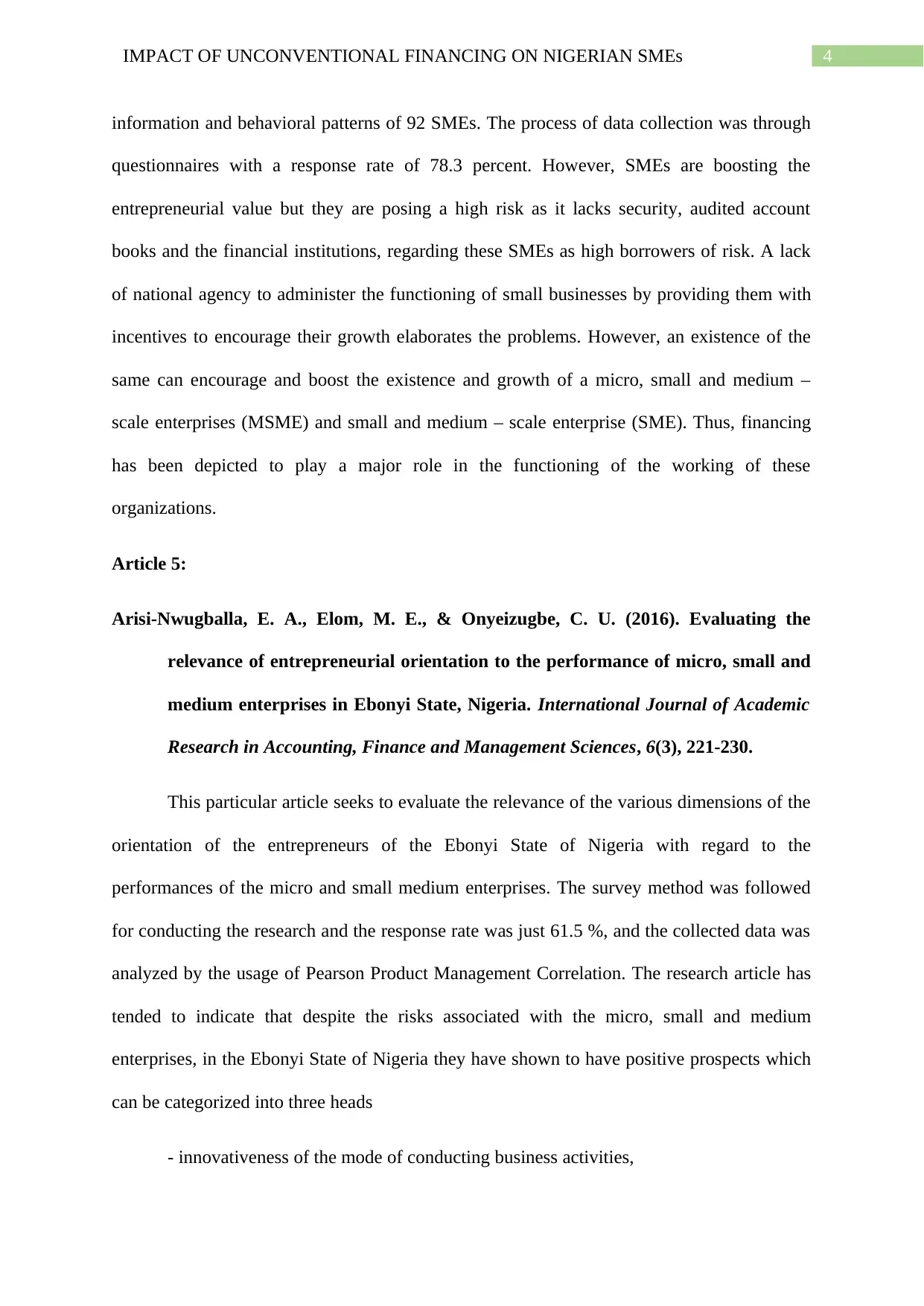
4IMPACT OF UNCONVENTIONAL FINANCING ON NIGERIAN SMEs
information and behavioral patterns of 92 SMEs. The process of data collection was through
questionnaires with a response rate of 78.3 percent. However, SMEs are boosting the
entrepreneurial value but they are posing a high risk as it lacks security, audited account
books and the financial institutions, regarding these SMEs as high borrowers of risk. A lack
of national agency to administer the functioning of small businesses by providing them with
incentives to encourage their growth elaborates the problems. However, an existence of the
same can encourage and boost the existence and growth of a micro, small and medium –
scale enterprises (MSME) and small and medium – scale enterprise (SME). Thus, financing
has been depicted to play a major role in the functioning of the working of these
organizations.
Article 5:
Arisi-Nwugballa, E. A., Elom, M. E., & Onyeizugbe, C. U. (2016). Evaluating the
relevance of entrepreneurial orientation to the performance of micro, small and
medium enterprises in Ebonyi State, Nigeria. International Journal of Academic
Research in Accounting, Finance and Management Sciences, 6(3), 221-230.
This particular article seeks to evaluate the relevance of the various dimensions of the
orientation of the entrepreneurs of the Ebonyi State of Nigeria with regard to the
performances of the micro and small medium enterprises. The survey method was followed
for conducting the research and the response rate was just 61.5 %, and the collected data was
analyzed by the usage of Pearson Product Management Correlation. The research article has
tended to indicate that despite the risks associated with the micro, small and medium
enterprises, in the Ebonyi State of Nigeria they have shown to have positive prospects which
can be categorized into three heads
- innovativeness of the mode of conducting business activities,
information and behavioral patterns of 92 SMEs. The process of data collection was through
questionnaires with a response rate of 78.3 percent. However, SMEs are boosting the
entrepreneurial value but they are posing a high risk as it lacks security, audited account
books and the financial institutions, regarding these SMEs as high borrowers of risk. A lack
of national agency to administer the functioning of small businesses by providing them with
incentives to encourage their growth elaborates the problems. However, an existence of the
same can encourage and boost the existence and growth of a micro, small and medium –
scale enterprises (MSME) and small and medium – scale enterprise (SME). Thus, financing
has been depicted to play a major role in the functioning of the working of these
organizations.
Article 5:
Arisi-Nwugballa, E. A., Elom, M. E., & Onyeizugbe, C. U. (2016). Evaluating the
relevance of entrepreneurial orientation to the performance of micro, small and
medium enterprises in Ebonyi State, Nigeria. International Journal of Academic
Research in Accounting, Finance and Management Sciences, 6(3), 221-230.
This particular article seeks to evaluate the relevance of the various dimensions of the
orientation of the entrepreneurs of the Ebonyi State of Nigeria with regard to the
performances of the micro and small medium enterprises. The survey method was followed
for conducting the research and the response rate was just 61.5 %, and the collected data was
analyzed by the usage of Pearson Product Management Correlation. The research article has
tended to indicate that despite the risks associated with the micro, small and medium
enterprises, in the Ebonyi State of Nigeria they have shown to have positive prospects which
can be categorized into three heads
- innovativeness of the mode of conducting business activities,
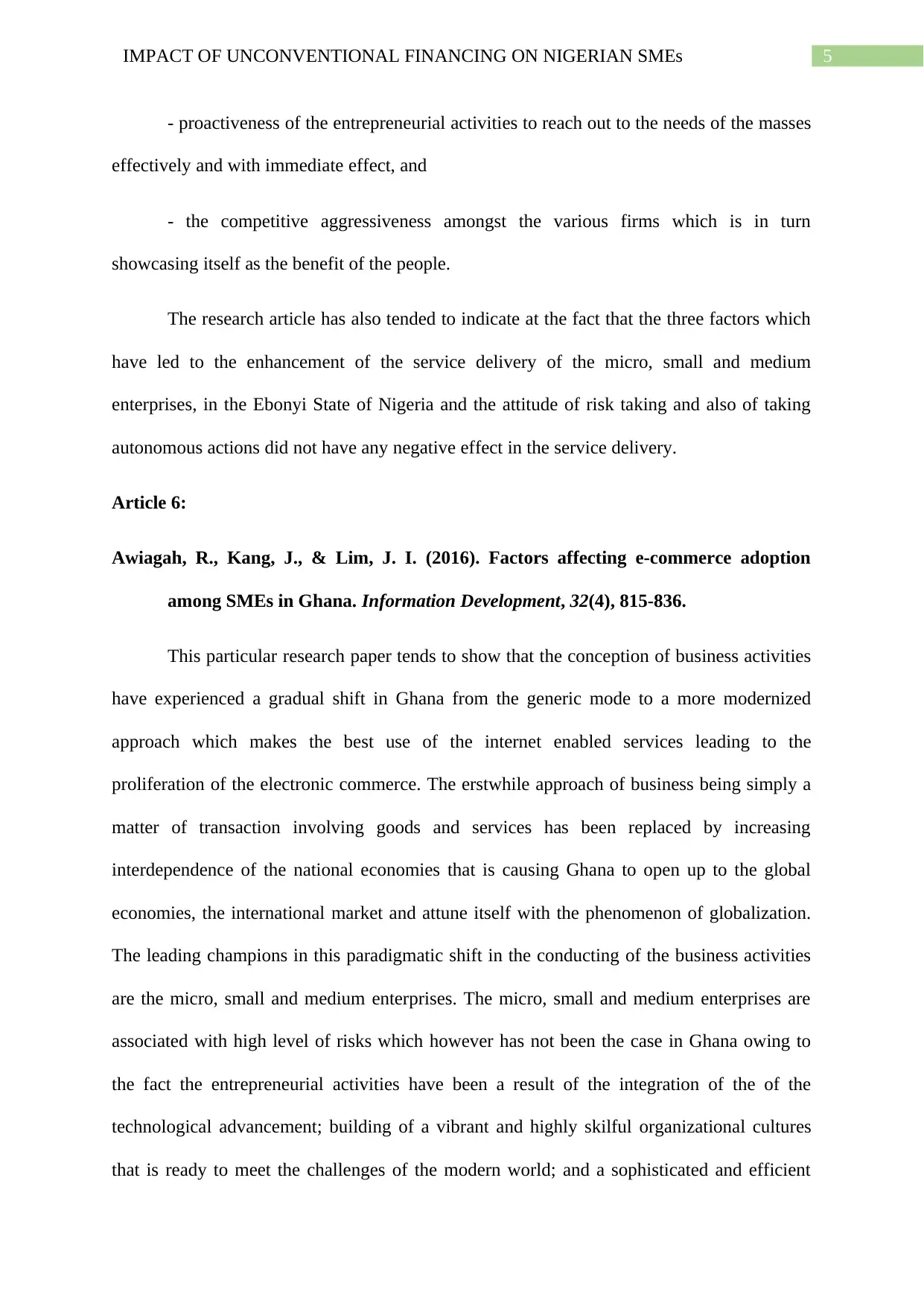
5IMPACT OF UNCONVENTIONAL FINANCING ON NIGERIAN SMEs
- proactiveness of the entrepreneurial activities to reach out to the needs of the masses
effectively and with immediate effect, and
- the competitive aggressiveness amongst the various firms which is in turn
showcasing itself as the benefit of the people.
The research article has also tended to indicate at the fact that the three factors which
have led to the enhancement of the service delivery of the micro, small and medium
enterprises, in the Ebonyi State of Nigeria and the attitude of risk taking and also of taking
autonomous actions did not have any negative effect in the service delivery.
Article 6:
Awiagah, R., Kang, J., & Lim, J. I. (2016). Factors affecting e-commerce adoption
among SMEs in Ghana. Information Development, 32(4), 815-836.
This particular research paper tends to show that the conception of business activities
have experienced a gradual shift in Ghana from the generic mode to a more modernized
approach which makes the best use of the internet enabled services leading to the
proliferation of the electronic commerce. The erstwhile approach of business being simply a
matter of transaction involving goods and services has been replaced by increasing
interdependence of the national economies that is causing Ghana to open up to the global
economies, the international market and attune itself with the phenomenon of globalization.
The leading champions in this paradigmatic shift in the conducting of the business activities
are the micro, small and medium enterprises. The micro, small and medium enterprises are
associated with high level of risks which however has not been the case in Ghana owing to
the fact the entrepreneurial activities have been a result of the integration of the of the
technological advancement; building of a vibrant and highly skilful organizational cultures
that is ready to meet the challenges of the modern world; and a sophisticated and efficient
- proactiveness of the entrepreneurial activities to reach out to the needs of the masses
effectively and with immediate effect, and
- the competitive aggressiveness amongst the various firms which is in turn
showcasing itself as the benefit of the people.
The research article has also tended to indicate at the fact that the three factors which
have led to the enhancement of the service delivery of the micro, small and medium
enterprises, in the Ebonyi State of Nigeria and the attitude of risk taking and also of taking
autonomous actions did not have any negative effect in the service delivery.
Article 6:
Awiagah, R., Kang, J., & Lim, J. I. (2016). Factors affecting e-commerce adoption
among SMEs in Ghana. Information Development, 32(4), 815-836.
This particular research paper tends to show that the conception of business activities
have experienced a gradual shift in Ghana from the generic mode to a more modernized
approach which makes the best use of the internet enabled services leading to the
proliferation of the electronic commerce. The erstwhile approach of business being simply a
matter of transaction involving goods and services has been replaced by increasing
interdependence of the national economies that is causing Ghana to open up to the global
economies, the international market and attune itself with the phenomenon of globalization.
The leading champions in this paradigmatic shift in the conducting of the business activities
are the micro, small and medium enterprises. The micro, small and medium enterprises are
associated with high level of risks which however has not been the case in Ghana owing to
the fact the entrepreneurial activities have been a result of the integration of the of the
technological advancement; building of a vibrant and highly skilful organizational cultures
that is ready to meet the challenges of the modern world; and a sophisticated and efficient
⊘ This is a preview!⊘
Do you want full access?
Subscribe today to unlock all pages.

Trusted by 1+ million students worldwide
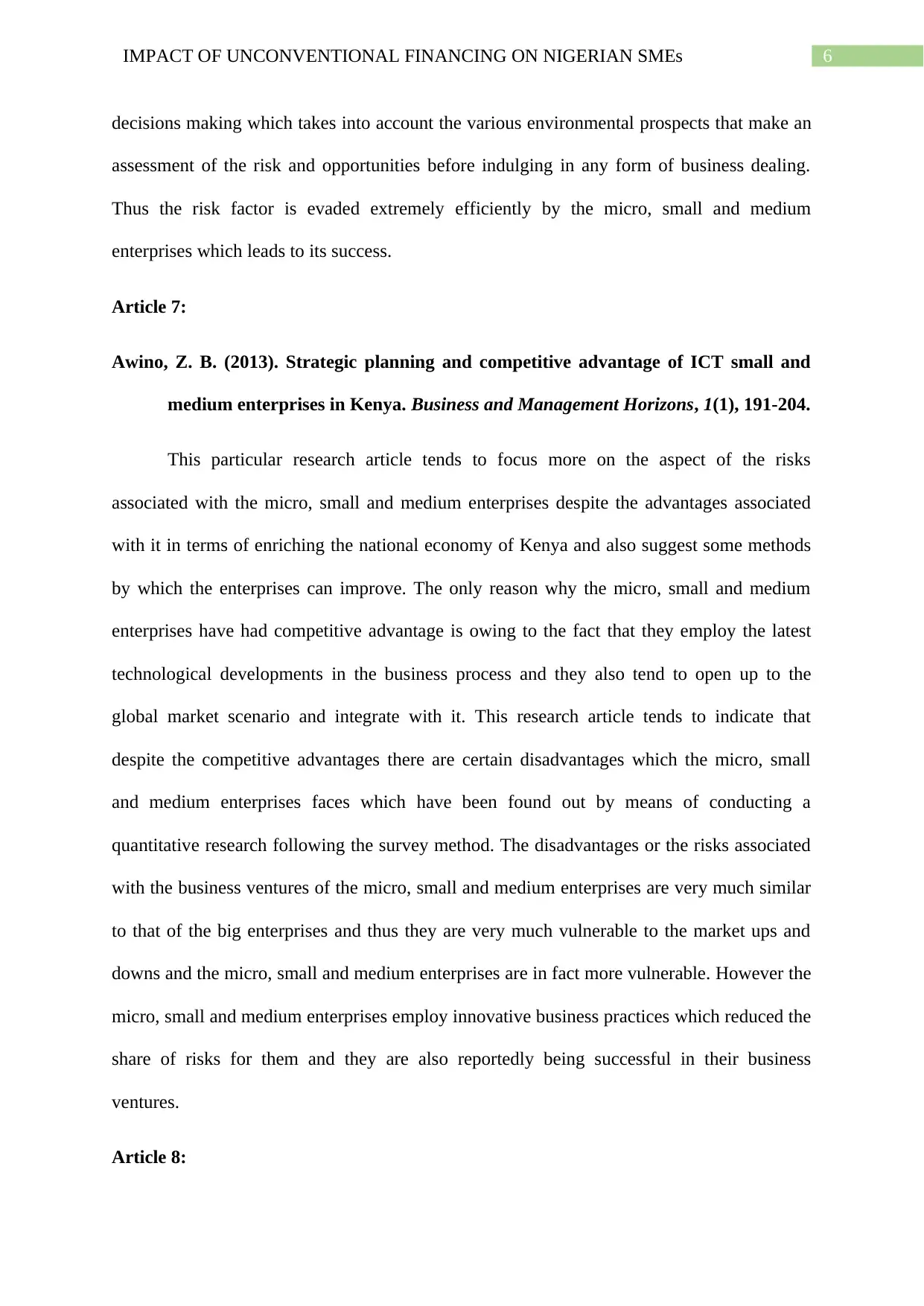
6IMPACT OF UNCONVENTIONAL FINANCING ON NIGERIAN SMEs
decisions making which takes into account the various environmental prospects that make an
assessment of the risk and opportunities before indulging in any form of business dealing.
Thus the risk factor is evaded extremely efficiently by the micro, small and medium
enterprises which leads to its success.
Article 7:
Awino, Z. B. (2013). Strategic planning and competitive advantage of ICT small and
medium enterprises in Kenya. Business and Management Horizons, 1(1), 191-204.
This particular research article tends to focus more on the aspect of the risks
associated with the micro, small and medium enterprises despite the advantages associated
with it in terms of enriching the national economy of Kenya and also suggest some methods
by which the enterprises can improve. The only reason why the micro, small and medium
enterprises have had competitive advantage is owing to the fact that they employ the latest
technological developments in the business process and they also tend to open up to the
global market scenario and integrate with it. This research article tends to indicate that
despite the competitive advantages there are certain disadvantages which the micro, small
and medium enterprises faces which have been found out by means of conducting a
quantitative research following the survey method. The disadvantages or the risks associated
with the business ventures of the micro, small and medium enterprises are very much similar
to that of the big enterprises and thus they are very much vulnerable to the market ups and
downs and the micro, small and medium enterprises are in fact more vulnerable. However the
micro, small and medium enterprises employ innovative business practices which reduced the
share of risks for them and they are also reportedly being successful in their business
ventures.
Article 8:
decisions making which takes into account the various environmental prospects that make an
assessment of the risk and opportunities before indulging in any form of business dealing.
Thus the risk factor is evaded extremely efficiently by the micro, small and medium
enterprises which leads to its success.
Article 7:
Awino, Z. B. (2013). Strategic planning and competitive advantage of ICT small and
medium enterprises in Kenya. Business and Management Horizons, 1(1), 191-204.
This particular research article tends to focus more on the aspect of the risks
associated with the micro, small and medium enterprises despite the advantages associated
with it in terms of enriching the national economy of Kenya and also suggest some methods
by which the enterprises can improve. The only reason why the micro, small and medium
enterprises have had competitive advantage is owing to the fact that they employ the latest
technological developments in the business process and they also tend to open up to the
global market scenario and integrate with it. This research article tends to indicate that
despite the competitive advantages there are certain disadvantages which the micro, small
and medium enterprises faces which have been found out by means of conducting a
quantitative research following the survey method. The disadvantages or the risks associated
with the business ventures of the micro, small and medium enterprises are very much similar
to that of the big enterprises and thus they are very much vulnerable to the market ups and
downs and the micro, small and medium enterprises are in fact more vulnerable. However the
micro, small and medium enterprises employ innovative business practices which reduced the
share of risks for them and they are also reportedly being successful in their business
ventures.
Article 8:
Paraphrase This Document
Need a fresh take? Get an instant paraphrase of this document with our AI Paraphraser
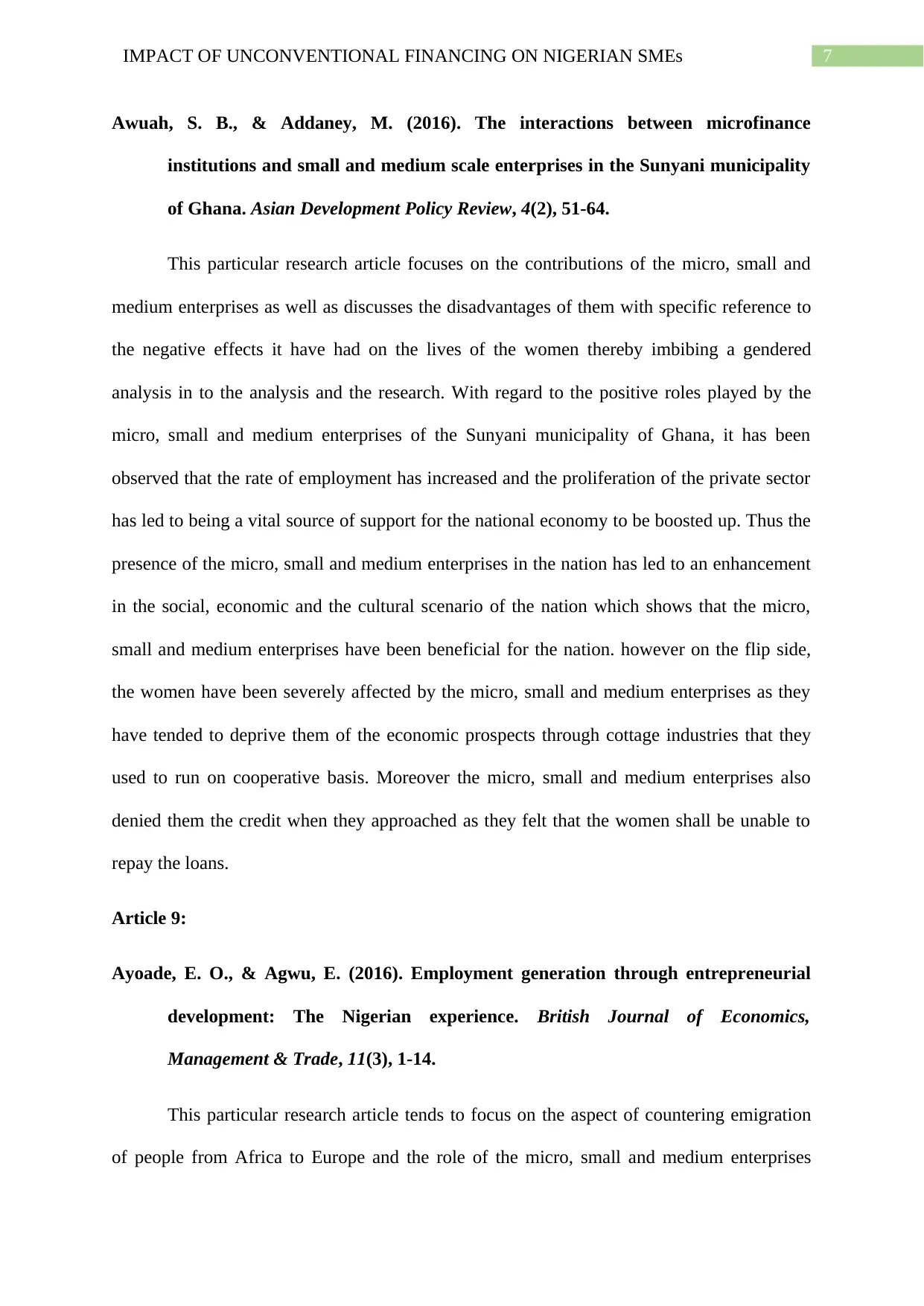
7IMPACT OF UNCONVENTIONAL FINANCING ON NIGERIAN SMEs
Awuah, S. B., & Addaney, M. (2016). The interactions between microfinance
institutions and small and medium scale enterprises in the Sunyani municipality
of Ghana. Asian Development Policy Review, 4(2), 51-64.
This particular research article focuses on the contributions of the micro, small and
medium enterprises as well as discusses the disadvantages of them with specific reference to
the negative effects it have had on the lives of the women thereby imbibing a gendered
analysis in to the analysis and the research. With regard to the positive roles played by the
micro, small and medium enterprises of the Sunyani municipality of Ghana, it has been
observed that the rate of employment has increased and the proliferation of the private sector
has led to being a vital source of support for the national economy to be boosted up. Thus the
presence of the micro, small and medium enterprises in the nation has led to an enhancement
in the social, economic and the cultural scenario of the nation which shows that the micro,
small and medium enterprises have been beneficial for the nation. however on the flip side,
the women have been severely affected by the micro, small and medium enterprises as they
have tended to deprive them of the economic prospects through cottage industries that they
used to run on cooperative basis. Moreover the micro, small and medium enterprises also
denied them the credit when they approached as they felt that the women shall be unable to
repay the loans.
Article 9:
Ayoade, E. O., & Agwu, E. (2016). Employment generation through entrepreneurial
development: The Nigerian experience. British Journal of Economics,
Management & Trade, 11(3), 1-14.
This particular research article tends to focus on the aspect of countering emigration
of people from Africa to Europe and the role of the micro, small and medium enterprises
Awuah, S. B., & Addaney, M. (2016). The interactions between microfinance
institutions and small and medium scale enterprises in the Sunyani municipality
of Ghana. Asian Development Policy Review, 4(2), 51-64.
This particular research article focuses on the contributions of the micro, small and
medium enterprises as well as discusses the disadvantages of them with specific reference to
the negative effects it have had on the lives of the women thereby imbibing a gendered
analysis in to the analysis and the research. With regard to the positive roles played by the
micro, small and medium enterprises of the Sunyani municipality of Ghana, it has been
observed that the rate of employment has increased and the proliferation of the private sector
has led to being a vital source of support for the national economy to be boosted up. Thus the
presence of the micro, small and medium enterprises in the nation has led to an enhancement
in the social, economic and the cultural scenario of the nation which shows that the micro,
small and medium enterprises have been beneficial for the nation. however on the flip side,
the women have been severely affected by the micro, small and medium enterprises as they
have tended to deprive them of the economic prospects through cottage industries that they
used to run on cooperative basis. Moreover the micro, small and medium enterprises also
denied them the credit when they approached as they felt that the women shall be unable to
repay the loans.
Article 9:
Ayoade, E. O., & Agwu, E. (2016). Employment generation through entrepreneurial
development: The Nigerian experience. British Journal of Economics,
Management & Trade, 11(3), 1-14.
This particular research article tends to focus on the aspect of countering emigration
of people from Africa to Europe and the role of the micro, small and medium enterprises
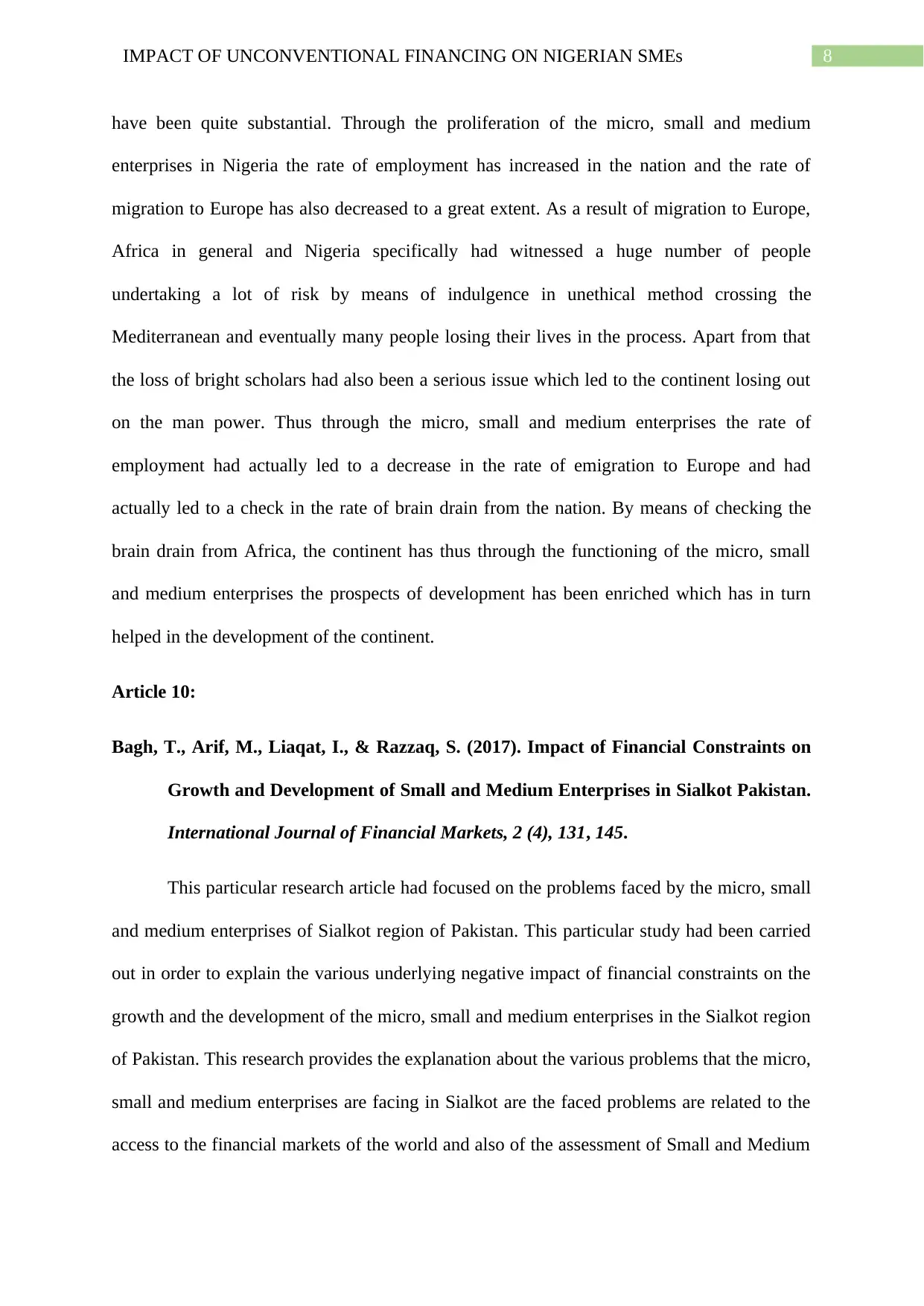
8IMPACT OF UNCONVENTIONAL FINANCING ON NIGERIAN SMEs
have been quite substantial. Through the proliferation of the micro, small and medium
enterprises in Nigeria the rate of employment has increased in the nation and the rate of
migration to Europe has also decreased to a great extent. As a result of migration to Europe,
Africa in general and Nigeria specifically had witnessed a huge number of people
undertaking a lot of risk by means of indulgence in unethical method crossing the
Mediterranean and eventually many people losing their lives in the process. Apart from that
the loss of bright scholars had also been a serious issue which led to the continent losing out
on the man power. Thus through the micro, small and medium enterprises the rate of
employment had actually led to a decrease in the rate of emigration to Europe and had
actually led to a check in the rate of brain drain from the nation. By means of checking the
brain drain from Africa, the continent has thus through the functioning of the micro, small
and medium enterprises the prospects of development has been enriched which has in turn
helped in the development of the continent.
Article 10:
Bagh, T., Arif, M., Liaqat, I., & Razzaq, S. (2017). Impact of Financial Constraints on
Growth and Development of Small and Medium Enterprises in Sialkot Pakistan.
International Journal of Financial Markets, 2 (4), 131, 145.
This particular research article had focused on the problems faced by the micro, small
and medium enterprises of Sialkot region of Pakistan. This particular study had been carried
out in order to explain the various underlying negative impact of financial constraints on the
growth and the development of the micro, small and medium enterprises in the Sialkot region
of Pakistan. This research provides the explanation about the various problems that the micro,
small and medium enterprises are facing in Sialkot are the faced problems are related to the
access to the financial markets of the world and also of the assessment of Small and Medium
have been quite substantial. Through the proliferation of the micro, small and medium
enterprises in Nigeria the rate of employment has increased in the nation and the rate of
migration to Europe has also decreased to a great extent. As a result of migration to Europe,
Africa in general and Nigeria specifically had witnessed a huge number of people
undertaking a lot of risk by means of indulgence in unethical method crossing the
Mediterranean and eventually many people losing their lives in the process. Apart from that
the loss of bright scholars had also been a serious issue which led to the continent losing out
on the man power. Thus through the micro, small and medium enterprises the rate of
employment had actually led to a decrease in the rate of emigration to Europe and had
actually led to a check in the rate of brain drain from the nation. By means of checking the
brain drain from Africa, the continent has thus through the functioning of the micro, small
and medium enterprises the prospects of development has been enriched which has in turn
helped in the development of the continent.
Article 10:
Bagh, T., Arif, M., Liaqat, I., & Razzaq, S. (2017). Impact of Financial Constraints on
Growth and Development of Small and Medium Enterprises in Sialkot Pakistan.
International Journal of Financial Markets, 2 (4), 131, 145.
This particular research article had focused on the problems faced by the micro, small
and medium enterprises of Sialkot region of Pakistan. This particular study had been carried
out in order to explain the various underlying negative impact of financial constraints on the
growth and the development of the micro, small and medium enterprises in the Sialkot region
of Pakistan. This research provides the explanation about the various problems that the micro,
small and medium enterprises are facing in Sialkot are the faced problems are related to the
access to the financial markets of the world and also of the assessment of Small and Medium
⊘ This is a preview!⊘
Do you want full access?
Subscribe today to unlock all pages.

Trusted by 1+ million students worldwide
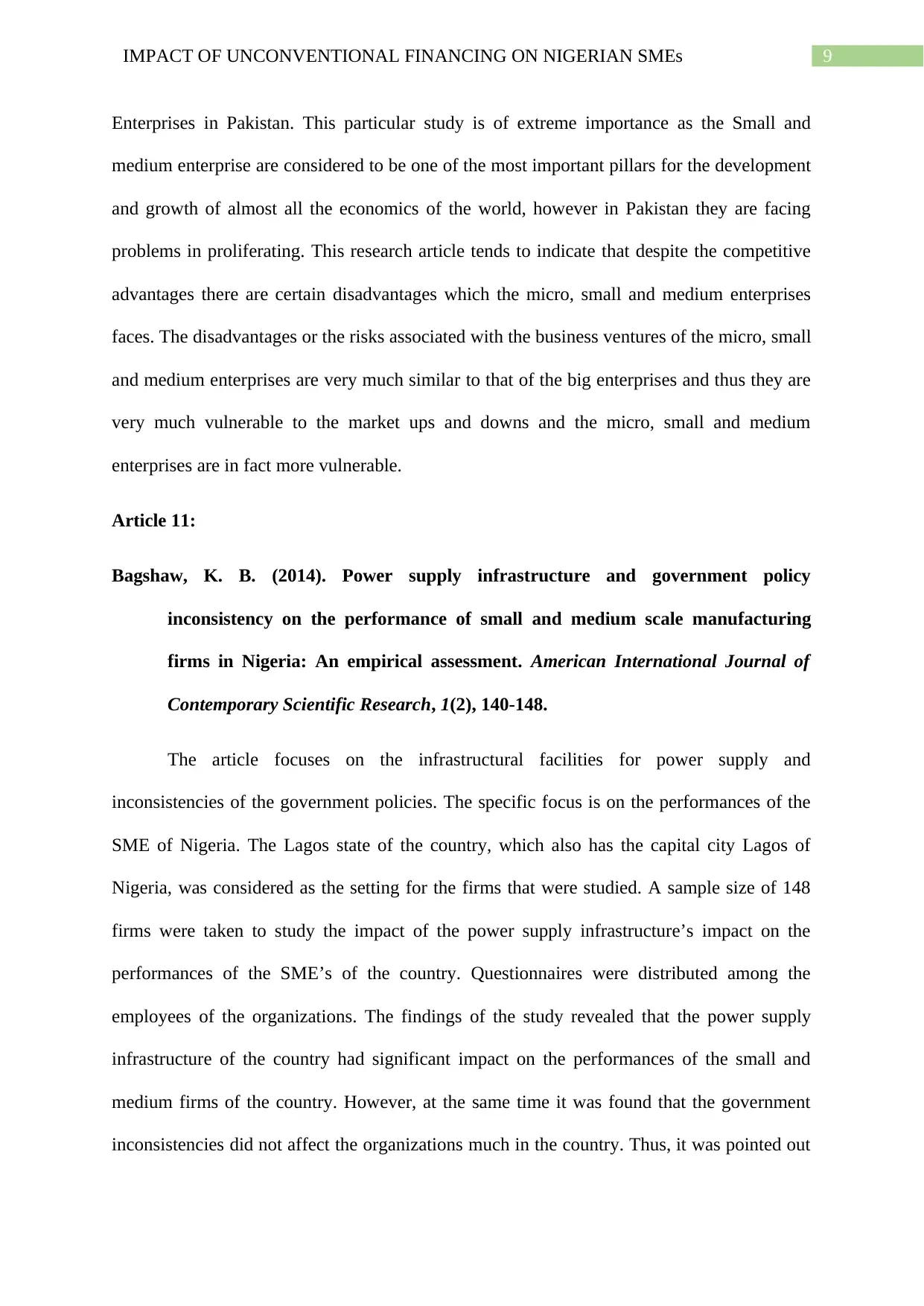
9IMPACT OF UNCONVENTIONAL FINANCING ON NIGERIAN SMEs
Enterprises in Pakistan. This particular study is of extreme importance as the Small and
medium enterprise are considered to be one of the most important pillars for the development
and growth of almost all the economics of the world, however in Pakistan they are facing
problems in proliferating. This research article tends to indicate that despite the competitive
advantages there are certain disadvantages which the micro, small and medium enterprises
faces. The disadvantages or the risks associated with the business ventures of the micro, small
and medium enterprises are very much similar to that of the big enterprises and thus they are
very much vulnerable to the market ups and downs and the micro, small and medium
enterprises are in fact more vulnerable.
Article 11:
Bagshaw, K. B. (2014). Power supply infrastructure and government policy
inconsistency on the performance of small and medium scale manufacturing
firms in Nigeria: An empirical assessment. American International Journal of
Contemporary Scientific Research, 1(2), 140-148.
The article focuses on the infrastructural facilities for power supply and
inconsistencies of the government policies. The specific focus is on the performances of the
SME of Nigeria. The Lagos state of the country, which also has the capital city Lagos of
Nigeria, was considered as the setting for the firms that were studied. A sample size of 148
firms were taken to study the impact of the power supply infrastructure’s impact on the
performances of the SME’s of the country. Questionnaires were distributed among the
employees of the organizations. The findings of the study revealed that the power supply
infrastructure of the country had significant impact on the performances of the small and
medium firms of the country. However, at the same time it was found that the government
inconsistencies did not affect the organizations much in the country. Thus, it was pointed out
Enterprises in Pakistan. This particular study is of extreme importance as the Small and
medium enterprise are considered to be one of the most important pillars for the development
and growth of almost all the economics of the world, however in Pakistan they are facing
problems in proliferating. This research article tends to indicate that despite the competitive
advantages there are certain disadvantages which the micro, small and medium enterprises
faces. The disadvantages or the risks associated with the business ventures of the micro, small
and medium enterprises are very much similar to that of the big enterprises and thus they are
very much vulnerable to the market ups and downs and the micro, small and medium
enterprises are in fact more vulnerable.
Article 11:
Bagshaw, K. B. (2014). Power supply infrastructure and government policy
inconsistency on the performance of small and medium scale manufacturing
firms in Nigeria: An empirical assessment. American International Journal of
Contemporary Scientific Research, 1(2), 140-148.
The article focuses on the infrastructural facilities for power supply and
inconsistencies of the government policies. The specific focus is on the performances of the
SME of Nigeria. The Lagos state of the country, which also has the capital city Lagos of
Nigeria, was considered as the setting for the firms that were studied. A sample size of 148
firms were taken to study the impact of the power supply infrastructure’s impact on the
performances of the SME’s of the country. Questionnaires were distributed among the
employees of the organizations. The findings of the study revealed that the power supply
infrastructure of the country had significant impact on the performances of the small and
medium firms of the country. However, at the same time it was found that the government
inconsistencies did not affect the organizations much in the country. Thus, it was pointed out
Paraphrase This Document
Need a fresh take? Get an instant paraphrase of this document with our AI Paraphraser
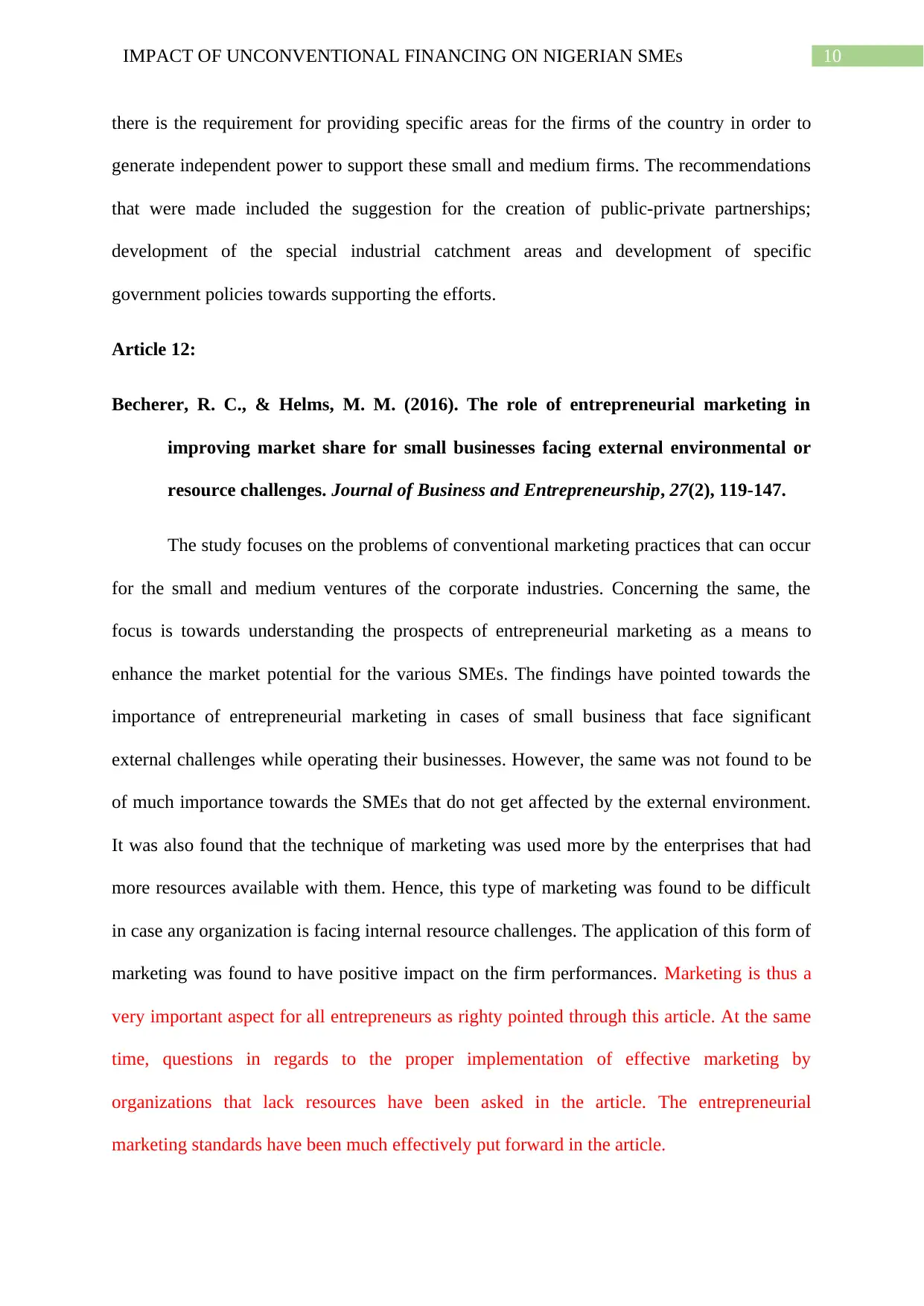
10IMPACT OF UNCONVENTIONAL FINANCING ON NIGERIAN SMEs
there is the requirement for providing specific areas for the firms of the country in order to
generate independent power to support these small and medium firms. The recommendations
that were made included the suggestion for the creation of public-private partnerships;
development of the special industrial catchment areas and development of specific
government policies towards supporting the efforts.
Article 12:
Becherer, R. C., & Helms, M. M. (2016). The role of entrepreneurial marketing in
improving market share for small businesses facing external environmental or
resource challenges. Journal of Business and Entrepreneurship, 27(2), 119-147.
The study focuses on the problems of conventional marketing practices that can occur
for the small and medium ventures of the corporate industries. Concerning the same, the
focus is towards understanding the prospects of entrepreneurial marketing as a means to
enhance the market potential for the various SMEs. The findings have pointed towards the
importance of entrepreneurial marketing in cases of small business that face significant
external challenges while operating their businesses. However, the same was not found to be
of much importance towards the SMEs that do not get affected by the external environment.
It was also found that the technique of marketing was used more by the enterprises that had
more resources available with them. Hence, this type of marketing was found to be difficult
in case any organization is facing internal resource challenges. The application of this form of
marketing was found to have positive impact on the firm performances. Marketing is thus a
very important aspect for all entrepreneurs as righty pointed through this article. At the same
time, questions in regards to the proper implementation of effective marketing by
organizations that lack resources have been asked in the article. The entrepreneurial
marketing standards have been much effectively put forward in the article.
there is the requirement for providing specific areas for the firms of the country in order to
generate independent power to support these small and medium firms. The recommendations
that were made included the suggestion for the creation of public-private partnerships;
development of the special industrial catchment areas and development of specific
government policies towards supporting the efforts.
Article 12:
Becherer, R. C., & Helms, M. M. (2016). The role of entrepreneurial marketing in
improving market share for small businesses facing external environmental or
resource challenges. Journal of Business and Entrepreneurship, 27(2), 119-147.
The study focuses on the problems of conventional marketing practices that can occur
for the small and medium ventures of the corporate industries. Concerning the same, the
focus is towards understanding the prospects of entrepreneurial marketing as a means to
enhance the market potential for the various SMEs. The findings have pointed towards the
importance of entrepreneurial marketing in cases of small business that face significant
external challenges while operating their businesses. However, the same was not found to be
of much importance towards the SMEs that do not get affected by the external environment.
It was also found that the technique of marketing was used more by the enterprises that had
more resources available with them. Hence, this type of marketing was found to be difficult
in case any organization is facing internal resource challenges. The application of this form of
marketing was found to have positive impact on the firm performances. Marketing is thus a
very important aspect for all entrepreneurs as righty pointed through this article. At the same
time, questions in regards to the proper implementation of effective marketing by
organizations that lack resources have been asked in the article. The entrepreneurial
marketing standards have been much effectively put forward in the article.
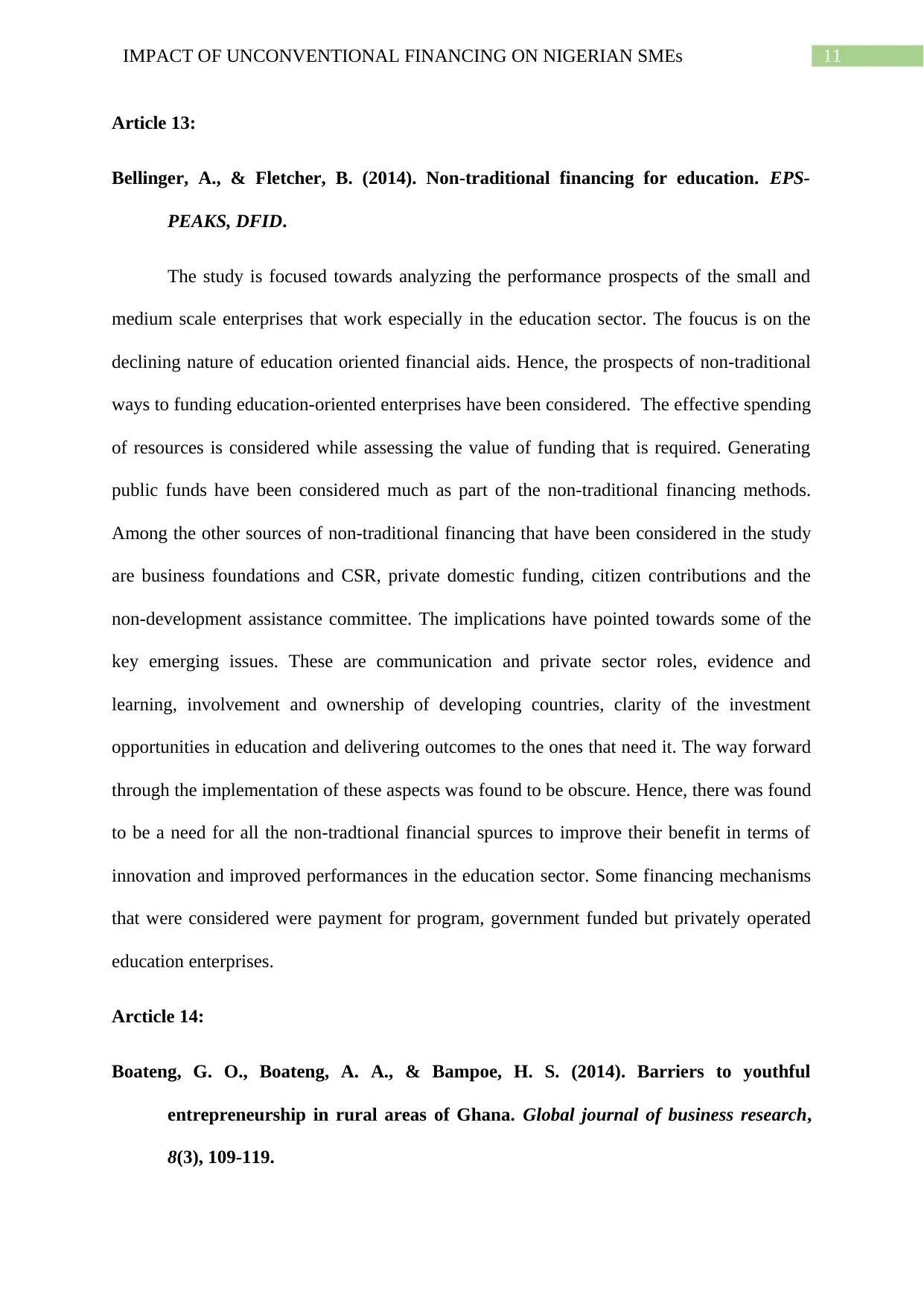
11IMPACT OF UNCONVENTIONAL FINANCING ON NIGERIAN SMEs
Article 13:
Bellinger, A., & Fletcher, B. (2014). Non-traditional financing for education. EPS-
PEAKS, DFID.
The study is focused towards analyzing the performance prospects of the small and
medium scale enterprises that work especially in the education sector. The foucus is on the
declining nature of education oriented financial aids. Hence, the prospects of non-traditional
ways to funding education-oriented enterprises have been considered. The effective spending
of resources is considered while assessing the value of funding that is required. Generating
public funds have been considered much as part of the non-traditional financing methods.
Among the other sources of non-traditional financing that have been considered in the study
are business foundations and CSR, private domestic funding, citizen contributions and the
non-development assistance committee. The implications have pointed towards some of the
key emerging issues. These are communication and private sector roles, evidence and
learning, involvement and ownership of developing countries, clarity of the investment
opportunities in education and delivering outcomes to the ones that need it. The way forward
through the implementation of these aspects was found to be obscure. Hence, there was found
to be a need for all the non-tradtional financial spurces to improve their benefit in terms of
innovation and improved performances in the education sector. Some financing mechanisms
that were considered were payment for program, government funded but privately operated
education enterprises.
Arcticle 14:
Boateng, G. O., Boateng, A. A., & Bampoe, H. S. (2014). Barriers to youthful
entrepreneurship in rural areas of Ghana. Global journal of business research,
8(3), 109-119.
Article 13:
Bellinger, A., & Fletcher, B. (2014). Non-traditional financing for education. EPS-
PEAKS, DFID.
The study is focused towards analyzing the performance prospects of the small and
medium scale enterprises that work especially in the education sector. The foucus is on the
declining nature of education oriented financial aids. Hence, the prospects of non-traditional
ways to funding education-oriented enterprises have been considered. The effective spending
of resources is considered while assessing the value of funding that is required. Generating
public funds have been considered much as part of the non-traditional financing methods.
Among the other sources of non-traditional financing that have been considered in the study
are business foundations and CSR, private domestic funding, citizen contributions and the
non-development assistance committee. The implications have pointed towards some of the
key emerging issues. These are communication and private sector roles, evidence and
learning, involvement and ownership of developing countries, clarity of the investment
opportunities in education and delivering outcomes to the ones that need it. The way forward
through the implementation of these aspects was found to be obscure. Hence, there was found
to be a need for all the non-tradtional financial spurces to improve their benefit in terms of
innovation and improved performances in the education sector. Some financing mechanisms
that were considered were payment for program, government funded but privately operated
education enterprises.
Arcticle 14:
Boateng, G. O., Boateng, A. A., & Bampoe, H. S. (2014). Barriers to youthful
entrepreneurship in rural areas of Ghana. Global journal of business research,
8(3), 109-119.
⊘ This is a preview!⊘
Do you want full access?
Subscribe today to unlock all pages.

Trusted by 1+ million students worldwide
1 out of 39
Your All-in-One AI-Powered Toolkit for Academic Success.
+13062052269
info@desklib.com
Available 24*7 on WhatsApp / Email
![[object Object]](/_next/static/media/star-bottom.7253800d.svg)
Unlock your academic potential
Copyright © 2020–2026 A2Z Services. All Rights Reserved. Developed and managed by ZUCOL.